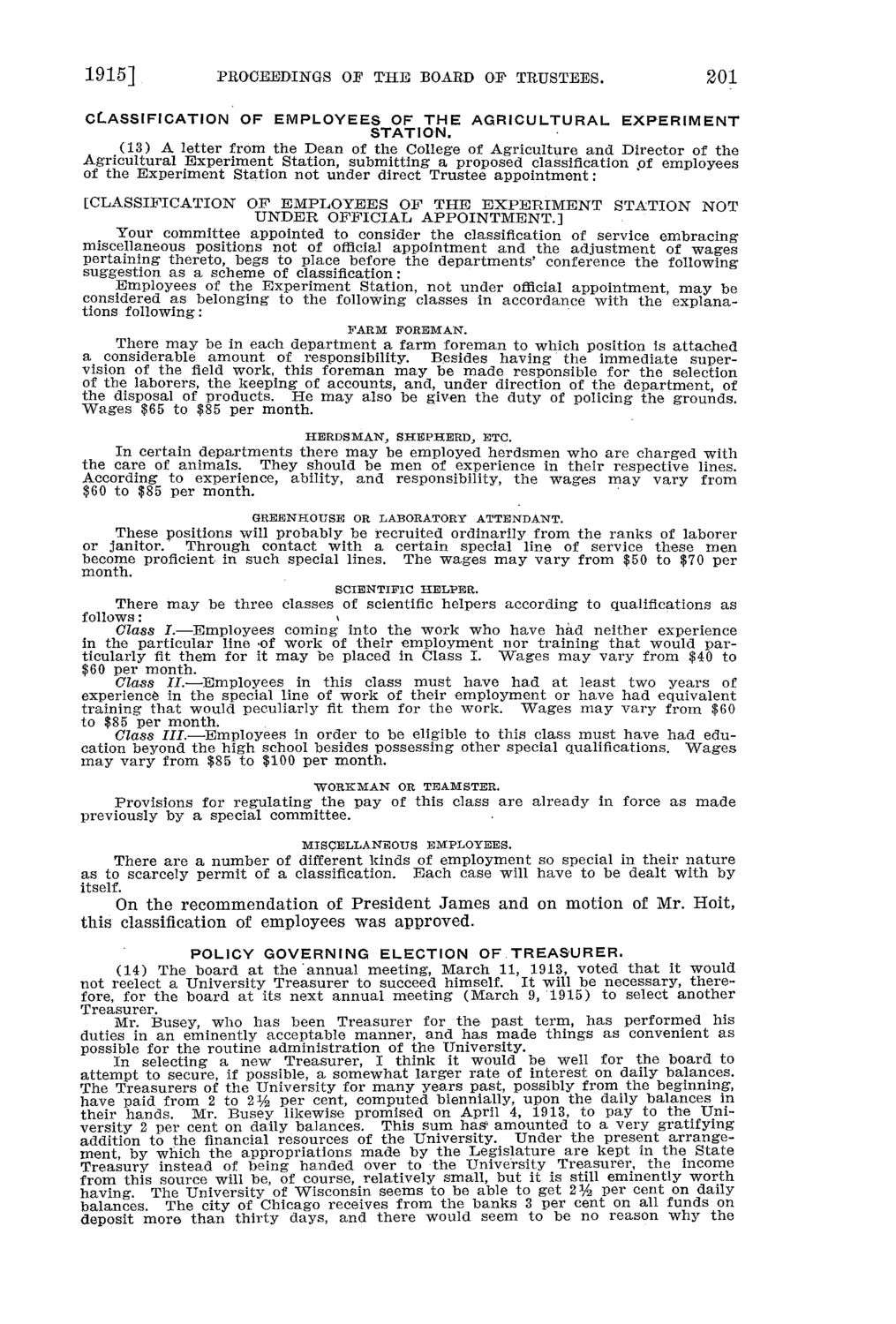| |
| |
Caption: Board of Trustees Minutes - 1916
This is a reduced-resolution page image for fast online browsing.

EXTRACTED TEXT FROM PAGE:
1915] PROCEEDINGS OE THE BOARD OF TRUSTEES. 201 CLASSIFICATION OF E M P L O Y E E S OF T H E A G R I C U L T U R A L E X P E R I M E N T STATION. (13) A letter from the Dean of the College of Agriculture and Director of the Agricultural Experiment Station, submitting a proposed classification of employees of the Experiment Station not under direct Trustee appointment: [CLASSIFICATION OF EMPLOYEES OF THE EXPERIMENT STATION NOT UNDER OFFICIAL APPOINTMENT.] Your committee appointed to consider the classification of service embracing miscellaneous positions not of official appointment and the adjustment of wages pertaining thereto, begs to place before the departments' conference the following suggestion as a scheme of classification: Employees of the Experiment Station, not under official appointment, may be considered as belonging to the following classes in accordance with the explanations following: FARM FOREMAN. There may be in each department a farm foreman to which position is attached a considerable amount of responsibility. Besides having the immediate supervision of the field work, this foreman may be made responsible for the selection of the laborers, the keeping of accounts, and, under direction of the department, of the disposal of products. He may also be given the duty of policing the grounds. Wages $65 to $85 per month. HERDSMAN, SHEPHERD, ETC. In certain departments there may be employed herdsmen who are charged with the care of animals. They should be men of experience in their respective lines. According to experience, ability, and responsibility, the wages may vary from $60 to $85 per month. GREENHOUSE OR LABORATORY ATTENDANT. These positions will probably be recruited ordinarily from the ranks of laborer or janitor. Through contact with a certain special line of service these men become proficient in such special lines. The wages may vary from $50 to $70 per month. SCIENTIFIC HELPER. There may be three classes of scientific helpers according to qualifications as follows: v Glass I.—-Employees coming into the work who have had neither experience in the particular line -of work of their employment nor training that would particularly fit them for it may be placed in Class I. Wages may vary from $40 to $60 per month. Class II.—Employees in this class must have had at least two years of experience in the special line of work of their employment or have had equivalent training that would peculiarly fit them for the work. Wages may vary from $60 to $85 per month. Class III.—Employees in order to be eligible to this class must have had education beyond the high school besides possessing other special qualifications. Wages may vary from $85 to $100 per month. WORKMAN OR TEAMSTER. Provisions for regulating the pay of this class are already in force as made previously by a special committee. MISCELLANEOUS EMPLOYEES. There are a number of different kinds of employment so special in their nature as to scarcely permit of a classification. Each case will have to be dealt with by itself. On the recommendation of President James and on motion of Mr. Hoit, this classification of employees was approved. POLICY G O V E R N I N G E L E C T I O N OF T R E A S U R E R . (14) The board at the annual meeting, March 11, 1913, voted that it would not reelect a University Treasurer to succeed himself. It will be necessary, therefore, for the board at its next annual meeting (March 9, 1915) to select another Mr. Busey, who has been Treasurer for the past term, has performed his duties in an eminently acceptable manner, and has made things as convenient as possible for the routine administration of the University. In selecting a new Treasurer, I think it would be well for the board to attempt to secure, if possible, a somewhat larger rate of interest on daily balances. The Treasurers of the University for many years past, possibly from the beginning, have paid from 2 to 2% per cent, computed biennially, upon the daily balances in their hands. Mr. Busey likewise promised on April 4, 1913, to pay to the University 2 per cent on daily balances. This sum has1 amounted to a very gratifying addition to the financial resources of the University. Under the present arrangement, by which the appropriations made by the Legislature are kept in the State Treasury instead of being handed over to the University Treasurer, the income from this source will be, of course, relatively small, but it is still eminently worth having. The University of Wisconsin seems to be able to get 2% per cent on daily balances. The city of Chicago receives from the banks 3 per cent on all funds on deposit more than thirty days, and there would seem to be no reason why the
| |